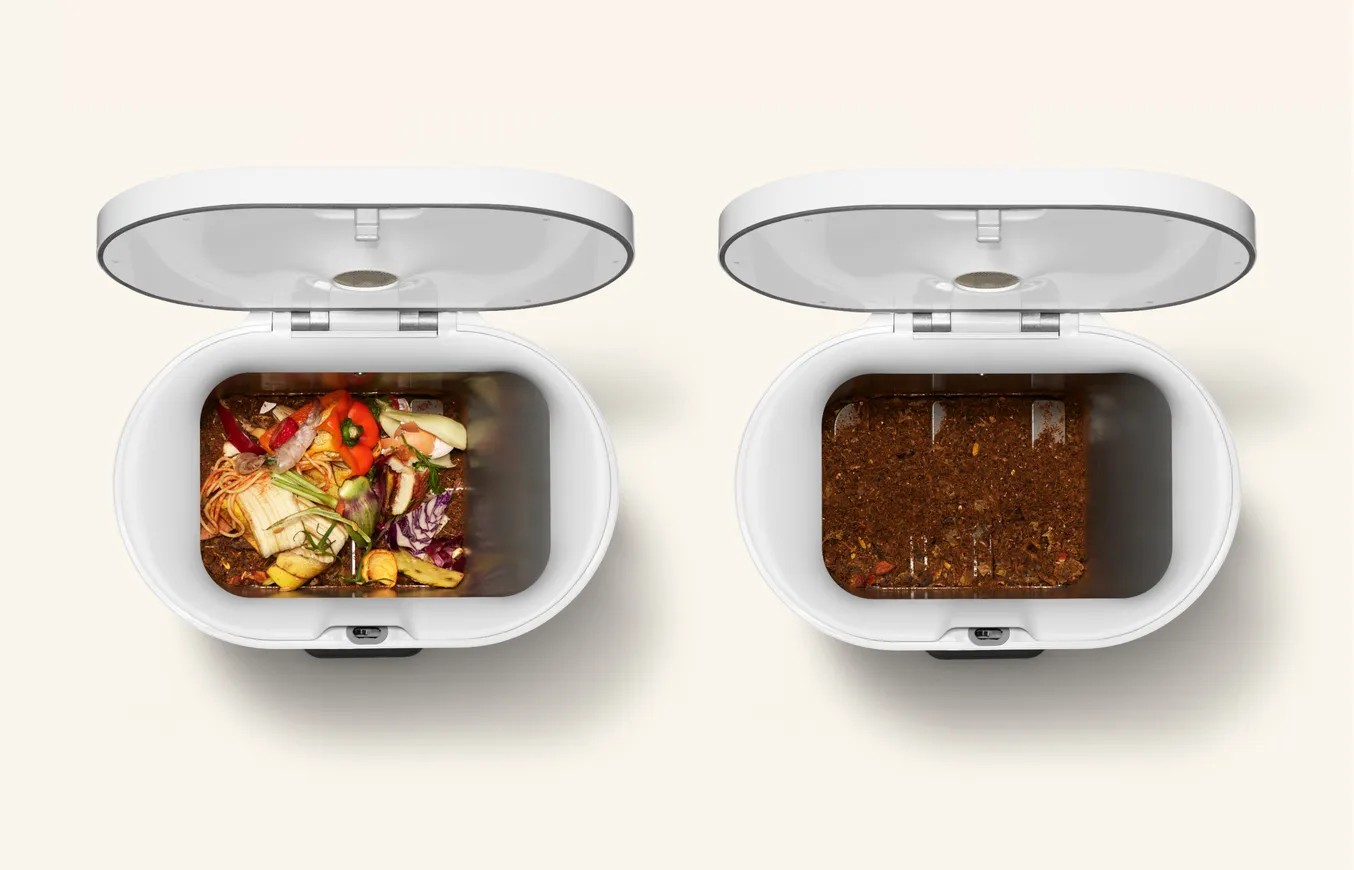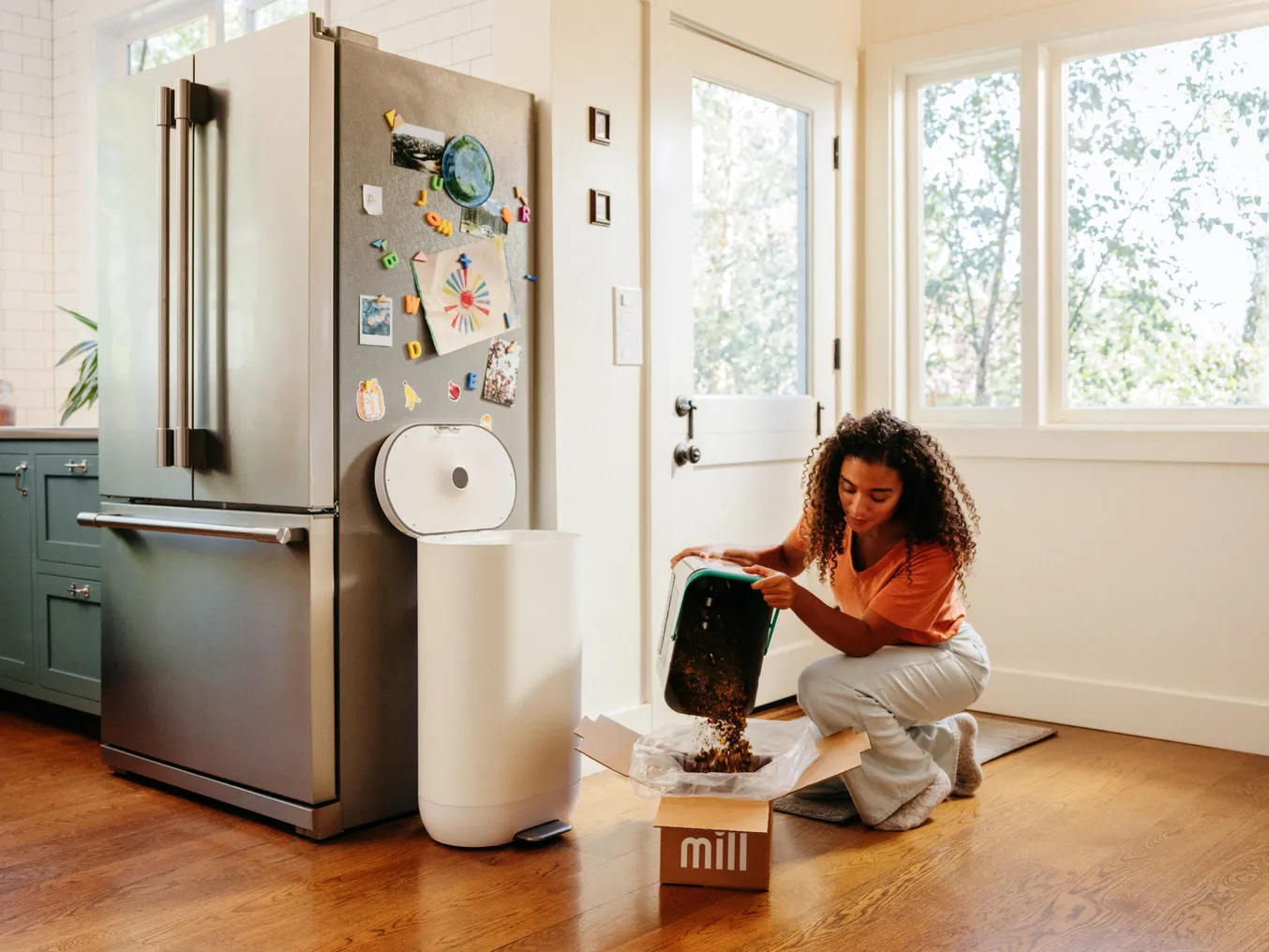
(Image courtesy of Mill Industries.)
Composting food scraps is an effective step that individual households can take to reduce greenhouse gas emissions attributed to food waste and return valuable nutrients to the soil. Though home composting has been slow to gain traction in the U.S., the emerging intersection of new waste management policies and new technology could accelerate the trend and engage office kitchens, too.
Taking the "ick factor" out of food recycling
Notably including New York City, some U.S. jurisdictions are beginning to adopt curbside food waste pickup regulations into their recycling programs. Curbside food waste pickup is a significant step towards reducing greenhouse gas emissions because it enables all residents to compost their scraps, regardless of whether they have a garden, instead of sending them to a landfill or incinerator.
While curbside pickup addresses the garden access problem, it does not account for resistance due to the "ick factor." In the U.S. and elsewhere, widely accepted hygiene standards dictate against storing rotting food in the home or yard.
“Nobody wakes up and says 'I’m excited to waste some food today,' but your options — especially in urban areas — are challenged by what the industry calls the 'ick factor,'” explains Harry Tannenbaum, co-founder of the food recycling company Mill Industries.
In a recent conversation with TriplePundit, Tannenbaum noted that many households are discouraged from composting, mainly due to the risk of attracting fruit flies and other pests. Unpleasant smells and the mere thought of keeping decayed food close at hand are additional obstacles.
The technology solution
Mill Industries’ solution is Mill, a compact, odor-free kitchen appliance that dehydrates food scraps and processes them into clean, dry grounds. The system is designed to handle meat and dairy waste as well as plant-sourced scraps.

The system’s sensors enable it to operate automatically, based on lessons learned from Tannenbaum’s previous experience with the leading smart home firm Nest. The goal was to develop a clean, seamless, and convenient way for households to keep food scraps out of the general waste stream.
“What we learned at Nest is that we need to build things that are better, faster, cheaper, make sense in kitchen, and with less smell and less work,” Tannenbaum told TriplePundit.
Another lesson learned at Nest is the importance of providing users with data and feedback. The Mill weighs incoming food, enabling users to track how many pounds of waste they divert to composting.
Once the food is reduced to dry grounds, it can be spread directly around a yard and garden, incorporated into a compost pile, or added to a curbside food waste recycling bin.
For customers without any of those options, Mill fostered new options with community partners and other stakeholders. In Phoenix, Arizona, a local farmer has agreed to pick up grounds from households. The company also partners with organizations in New York City to link its customers with local community gardens.
As an additional option, the U.S. Postal Service will ship the grounds from the customer to a composting facility.

Access to next-level food waste recycling
Composting is an environmentally acceptable way to reduce food waste, Tannenbaum said. But re-purposing food waste for animal feed yields even bigger environmental gains.
The animal feed option is emerging for Mill Industries’ customers. Earlier this year the Washington State Department of Agriculture approved the distribution of the company’s grounds as an ingredient in poultry feed, the first such commercial application of household-sourced food scraps.
The latest food waste-reducing technology is not for everyone, though. A rental option is available for the Mill, but the retail price is in the range of $1,000.
Opportunities for businesses
The high cost of a high tech food waste converter is beyond the reach of many households, but it can be a good fit for companies in search of new additions to their environmental program budget.
As applied to office use, new composting technology can help employers spark discussions about food waste in general. Apart from the benefits of composting, the conversations can include strategies for reducing food waste at the source and saving money on groceries, including cooking with leftovers, right-sized portions, and planning ahead for meals and grocery shopping.
Every kitchen makes a difference
With global attention focused on big-picture solutions to the climate crisis, companies can also deploy composting to focus attention on the key role of individuals in reducing food waste.
Food waste is both a hunger problem and a greenhouse gas problem. The United Nations estimates that roughly 30 percent of the world’s food is lost to waste. Roughly 13 percent of that loss occurs between harvesting and the retail stage and 17 percent is attributed to retail, food service, and household use, indicating that individual habits can make a significant impact on food waste.
The importance of the individual kitchen is underscored by a 2019 food waste study conducted by the EPA. Still cited today, the study found that 66.2 million tons of food waste occurred in the U.S. in 2019 from the food retail, food service and residential sectors. Households alone accounted for 40 percent of that figure.
The "ick factor" may never go away completely, but companies can help push it to the side by introducing their employees to new solutions that help them make an impact on the global food waste crisis, one kitchen at a time.

Tina writes frequently for TriplePundit and other websites, with a focus on military, government and corporate sustainability, clean tech research and emerging energy technologies. She is a former Deputy Director of Public Affairs of the New York City Department of Environmental Protection, and author of books and articles on recycling and other conservation themes.














